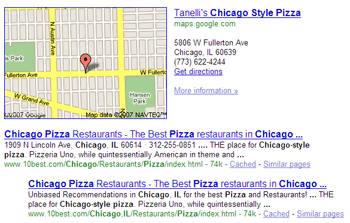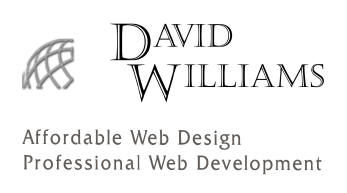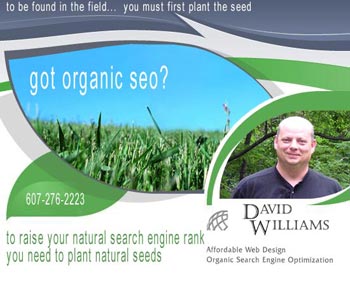SmallBizNews
Here is your FREE quarterly issue of SmallBizNews - a
brief and informative Internet Marketing Newsletter offering up to date tips and
trends for effectively marketing your Small Business on the
Internet. To manage your SmallBizNews Newsletters, ask questions
or change your subscription status simply see the
subscription details at the bottom of this email.
Be sure to check out
past issues of SmallBizNews for other Internet Marketing
ideas as
well. We invite your ideas, comments and suggestions. We changed
our format to a quarterly newsletter in the Spring of
2006 due to time constraints. We hope you will continue to find SmallBizNews
an informative resource for your internet marketing efforts.
Natural SEO & Organic SEO Professional
What is Organic
SEO & Natural SEO
April 24, 2007
In the interest of
being brief (a.k.a. - I'm behind elsewhere in my work) I will
provide a few brief definitions of Organic SE and Natural SEO.
Natural SEO & Organic SEO (Search Engine
Optimization) and Search Engine Marketing (SEM)
Despite the fact that many SEO firms gear
themselves to PPC ads for their clients ~ the truth is - these
activities have nothing to do with Natural SEO, Organic SEO and
Increased Placement (rank) in Natural / Organic SERPs.
Natural SEO & Organic SEO can be simply
defined as: Planting Natural Seeds for Natural Growth and
Increased Placement in Natural Search Engine Results without the
use of Pay Per Click (PPC) Ads.

High ranking Natural listings in the
search engines (top placement in the search engines) are merit
based and earned by deploying Ethical Organic SEO tactics
thereby creating Search Engine Friendly web pages. It has
nothing to do with pay-per-click ads.
Google (and the other search engines)
strive constantly to improve their SERPs in order to give you
the most relevant and reputable results for your search queries
at the top left side of the SERPs ranked in descending order.
If you want to earn a high placement in
the natural listings you need to be considered one of the most
relevant and reputable sites for your desired keywords,
long-tail keywords and topics. There are no short cuts - it
takes hard work.
Bottom line is - if you want to achieve
High Natural | Organic Listings in the search engines = roll up
your sleeves and plant natural |organic SEO seeds and set about
the tasks of pruning, weeding and fertilizing using only Ethical
Organic SEO & Natural SEO Practices with firm roots in Organic
SEO ground.
Call me today for a
Natural SEO & Organic
SEO assistance. (607) 276-2223 or email me at:
Dave@DavidWilliams.biz
May 21, 2007

|
Google unveiled its latest search enhancement, appropriately
titled "Universal Search".
Google's Universal Search will change the landscape of SERPs
forever by integrating all of its various search verticals
into one search engine results page. From here forward if
you enter a search query, relevant results from Google Maps,
Google Images, Google Video, Google Blog Search, Google News
and the other search categories will start appearing above
the main web results.
In keeping with Google's ongoing efforts to deliver the most
relevant and reputable results to searchers - from a
searcher's view point this is big news because these results
make the main search engine results page more intuitive and
user-centric.
Universal Search makes it possible to navigate to different
pages to find "all" relevant content about a particular
query. Whether you're looking for a local business, or
trying to uncover a new video, all of these searches can be
performed from the one "Universal" place.
If I were a betting man I would put money on the other top
search engines deploying similar tactics in the near future.
Hats off to Google again! Now lets get to the task of
creating search engine friendly pages with other search
engine verticals in mind to take advantage of these
opportunities for increased exposure that Universal Search
offers!
|
Dynamic vs. Static Web Development
|
|
Here we go again...
revisiting an all too familiar argument among developers and SEO
Professionals - and the debate continues.
But, since it is
still worthy of discussion I will venture into the topic of
Dynamically Generated Pages vs. Static Pages as it relates to
Organic Search Engine Optimization.
Dynamic Web Pages
Most dynamic web
pages are generated in response to queries run against databases
within the website. When a visitor comes to your website and
looks for 'peanut butter and raspberry jam sandwiches', it is
this database that supplies the response by building the page
from a specified template and returning the results from the
database that match the variables in the query.
|
|
Certified Organic SEO
|
|
While the search
engines are getting better at reading them, dynamic pages
are created on the fly with technology such as ASP, Cold
Fusion, Perl and the like. These pages function well for
users who visit the site, but they don't work well for
search engine crawlers (spiders).
Why? Because dynamically generated pages don't actually
exist until a user selects the variable (s) that generate
them. A search engine spider can't select variables, so the
pages don't get generated properly -– and therefore can’t be
indexed as easily as static pages.
The biggest
problem is that search engine crawlers such as GoogleBot
cannot always read the entire dynamic database of URLs,
which either contain a query string (?) or other database
characters (#&*!%) known to be search engine spider
(crawler) traps. Because search engine crawlers have
problems reading deep into a dynamic database, they’ve been
programmed to detect and ignore many dynamic URLs.
Static Web
Pages
In contrast,
static web pages with static URL's in their navigation
hierarchy tend to fare much better.
Why? Because
there is a real page with real content linked
via real hyperlinks that make it simple for search
engine spiders to crawl the site in its entirety.
Again, as Google
(Yahoo!, MSN/Live) endeavor to return the most relevant
results possible in their SERP's. It only makes
sense that their means of delivering the most relevant
possible results in their Search Engine Results Pages (SERPs)
are based upon the data collected by the search engine
spiders.
Content
Management Systems (CMS) are great for reducing steps for
employees - but at what price to your ranking in the search
engines?
Want Good Ole'
Fashioned Search Engine Friendly Results? Roll up your
sleeves and do some Good Ole' Fashioned Organic SEO on
Static Web Pages.
The answer is clear - Ethical Organic SEO (Search Engine Optimization)
and Organic Web Design
Google's suggestions for Quality Web Pages fall under three
basic criteria:
1. Provide relevant and substantial content
2. Treat a user's personal information responsibly
3. Develop an easily navigable site
Seems like good guidelines to me :) If you desire ethical
web design & development and approved Organic Search Engine
Optimization...
Organic SEO
Professional Using Only Approved White Hat Tactics
|
|
Effective copy writing is the first step to
promoting your web site in your internet marketing
endeavors.
We have recognized an increasing trend in search engine
behavior that will one day change the way web pages are
written and developed. Pages that used to rely heavily on
keywords and metatags to lure traffic will soon become a
thing of the past.
Trust me on this one as I go on the record to say that soon,
the search engines will look at and
review the written copy of the page to determine the page
relevance and value to the search query.
When this happens - Effective SEO will become what we have
been encouraging since day one. Always write for your
clients first - Content is Crucial and Content is King.
The Kelsey research group published these statistics and
trends:
-
74%
of households use the Internet as an information source when
shopping locally.
-
Approximately 45% of local searches had a buying intent.
-
The
percentage of respondents who used yellow page directories
decreased from 75% to 62%. (If you have a yellow page ad, it
is time to consider buying a smaller ad and shifting your
marketing dollars to the Internet.)
|
 As
local business owners you need to take action now. You need
to keep your existing customers, and gain new customers, so
you need to be found where they are searching. Local Search
Marketing is where your future clients and customers will
come from.
So where do you start?
Well, go back to the first paragraph of this article and
you'll notice that Local Searches are now over two years
old. It is still free to modify your listings with:
-
Google Local
-
Yahoo Local
-
and
so on...
These complimentary features of local search and a little
initiative on your part and you'll be well on your way. |
|
Write for Your Prospective
Clients First
|
David Williams is proud to be a
small business owner in the United States
Small Businesses in the
United States
(defined as independent
businesses with fewer than 500 employees):
-
Represent 99.7 percent of
all employer firms.
-
Employ half of all private
sector employees.
-
Pay more than 45 percent of
total U.S. private payroll.
-
Have generated 60 to 80
percent of net new jobs annually
over the last decade.
-
Create more than 50 percent
of nonfarm private gross
domestic product (GDP).
-
Supplied more than 23
percent of the total value of federal
prime contracts in FY 2005.
-
Produce 13 to 14 times more
patents per employee than
large patenting firms. These patents are twice as likely
as
large firm patents to be among the one percent most
cited.
-
Are employers of 41 percent
of high tech workers (such as
scientists, engineers, and computer workers).
-
Are 53 percent home-based
and 3 percent franchises.
-
Made up 97 percent of all
identified exporters and produced
28.6 percent of the known export value in FY 2004.
Sources: U.S. Bureau of the Census; Advocacy-funded research
by Joel
Popkin and Company, Jan. 2002 (see www.sba.gov/advo/research/rs211.pdf);
Federal Procurement Data System; Advocacy-funded research by
CHI
Research, Inc., Feb. 2003 (see www.sba.gov/advo/research/rs225.pdf);
Bureau of Labor Statistics, Current Population Survey; U.S.
Department of
Commerce, International Trade Administration. |
|
|
|
 |
What's New?
BusinessLaw.gov has been incorporated into Business.gov.
Before launching your business, be sure to check on specific
laws and regulations in your area. |
|
Small Business
Administration |
|
|
|
|
 |
|
A wealth of FREE information, regulations and forms for
Small Business Owners every where.
Small Business and Self-Employed One-Stop Resource. |
Question:
Google Canonicalization?
"What is a canonical url? -
Sami Manhattan, New York
Answer:
Dear Sami,
Canonicalization
is indeed an odd word; that found its birthplace within
Google.
Canonicalization
is the process of picking the best url when there are
several choices, and it usually refers to home pages.
For example, most people would consider these the same urls:
www.example.com
example.com/
www.example.com/index.html
But technically all of these urls are different. A web
server could return completely different content for each of
the different urls listed above.
When Google
“canonicalizes” a url, they try to pick the url that seems
like the best representative from that set.
For More info on the post:
http://www.mattcutts.com/blog/seo-advice-url-canonicalization/
All the best,
Dave
We
offer two great FREE Whitepapers for you to download and
employ as brainstorming tools. You can get your FREE Web
Site Planner and Getting Started Guide from
DavidWilliams.Biz on our
Free Whitepapers Page
And I would be
remiss if I didn't at least extend you an offer to serve as
both your Web Developer
AND SEO
Firm. If I've already put this much thought
into it - imagine how hard I would work for you if I was
paid :)
Thanks Again for
visiting us!
|
 |
|
|
| |
|
|
|
|
|
|
(recent articles only - older issues have been removed)
Check out Dave's actual client
case studies to view quantifiable results achieved by David Williams
for his SEO clients.
Legal Notice |
To ask David Williams
a question
click here.
To Subscribe
to SmallBizNews
click here.
To Unsubscribe
from SmallBizNews
click here.

David Williams - Affordable Web Design | Professional Web
Development |

![]()